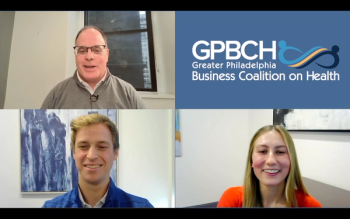
Upcoming PBMI Events

A look at upcoming events hosted by the Pharmacy Benefit Management Institute.
Upcoming
2020 Outlook: Innovation or Status Quo?
January 30
1:30 pm ET
Will 2020 bring innovation or more of the same for employers? This presentation explores how formulary changes, biosimilars, gene therapies, public policy and PBM contracting will contribute to employer strategies moving forward.
Attendees will learn:
- How employers can better evaluate the PBM marketplace and what impact common contract caveats have on total cost
- How biosimilars and gene therapies will impact employer specialty spend
- What other market dynamics, including new formularies, pricing models and public policy factor into employer strategies
Presenters:
Mike Stull, MBA, chief strategy officer, Employers Health
Matt Harman, PharmD, director of pharmacy, Employers Health
2020 National Conference
March 2-4, 2020
Rosen Shingle Creek Hotel
9939 Universal Blvd
Orlando, FL 32819
The keynote speaker will be Barry Meier, author and Pulitzer Prize-winning former reporter for The New York Times.
Past
Specialty Pipeline Development in Key and Unique Therapeutic Areas
October 1
1:30 pm ET
This session will take a look into the near future of potential specialty drug releases, their potential impact, and what it means to patients, pharmacies, and payers. We will examine the landscape of drug development in pharmacy now and compare it to a time not too long ago. This webinar includes detailed discussions on Alzheimer disease, nonalcoholic steatohepatitis, and cystic fibrosis.
Presenter: Ryan J. Atkinson, PharmD, MBA, senior director of specialty pharmacy strategy, Maxor
Oncology Care: Leveraging the Medically Integrated Pharmacy Care Model to Achieve Greater Cost Savings
October 16
1:30 pm ET
National conference breakout session encore
This session will lead a discussion around the pain points in oncology care and the various innovations in the care model and provider types that are emerging to meet the needs of payers. The presenters will contrast existing known models and the medically integrated pharmacy care model provider option and the value each shares and where they differ. They will also cover what a typical patient journey looks like in a medically integrated pharmacy care oncology model.
Presenters:
Gury Doshi, MD, medical director, oral oncolytics, Texas Oncology
Jim Schwartz, RPh, executive director, pharmacy operations, Texas Oncology
Incorporating Patient Reported Outcomes and Real-World Evidence in Specialty Pharmacy Management to Improve Clinical Outcomes
October 22
1:30 pm ET
National conference breakout session encore
Healthcare is experiencing a major paradigm shift, moving away from fee for service to pay for performance. With this paradigm shift, there have been many opinions on how to measure performance. Traditionally, healthcare quality was measured using biomarkers associated with improvement of disease state. These measures, while important, do not accurately provide the entire continuum of quality healthcare. Over the past several years, a greater focus is shifting to incorporate patient reported outcomes (PROs) into the overall measurement of healthcare performance. In addition, payers are interested in incorporating real-world evidence (RWE) in formulary management, which provides a clearer picture of the impact of a medication on patient outcomes.
This presentation will describe the differences between PROs, RWE, and other quality measures. Attendees will gain insight regarding how payers can leverage information from PROs and RWE to effectively review and manage formularies. Additionally, we will demonstrate how specialty pharmacies can be at the forefront generating RWE and obtaining PROs and how they can apply this information to improve clinical practice.
Presenters:
Patty Taddei-Allen, PharmD, MBA, director of outcomes research, WellDyneRx
Nick Page, PharmD, chief pharmacy officer, WellDyneRx
3 Ways to Improve Your Rx Benefit Plan Performance
November 7
1:30 pm ET
Pharmacy costs are on the rise, driving up concern among plan sponsors on how to better manage expenses. According to a recent report, by 2023 drug spend is expected to increase to over $420 billion per year. So what can you do to effectively manage your pharmacy benefit costs? During this webinar, we’ll discuss 3 key areas that you can fine tune to improve benefit plan performance, increase savings, and reach your financial goals.
Presenters:
Amy Schmerse, PharmD, senior manager of clinical account executive, Navitus Health Solutions
Merle Jarvill, RPh, senior manager of clinical account executive, Navitus Health Solutions
Standards to Support Specialty Pharmacy Data Exchange
November 13
1:30 pm ET
This webinar will outline the current state of standards to support specialty pharmacy data exchange. Points of discussion include e-prescribing, enrollment, reporting, and real-time benefit checks. Attendees will learn what’s available today, what’s coming in 2020, and what’s under development.
Presenters:
Laura Topor, BA, president, Granada Health
Optimizing Protection of Your Healthcare Data
December 4, 2019
1:30 pm ET
Data breaches are on the rise, leading to an array of new privacy and cybersecurity laws worldwide. Healthcare companies must secure data while meeting compliance demands and prepare for the worst case scenario. Our panel will discuss a proactive and integrated approach to privacy, security, regulatory compliance, and vendor oversight within complex healthcare organizations.
Presenters: Jack Thompson, Esq, MPH; Chad Bairnsfather, CISSP, director, information security; Brandon Fairless, assistant general counsel, EnvisionRx
Improving Total Cost of Care for Patients With Diabetes and Cardiovascular Disease
December 10, 2019
1:30 pm ET
Diabetes impacts about 1 in 10 Americans, 90 to 95% of whom have type 2 diabetes. Among adults with type 2 diabetes, 1 in 5 also has cardiovascular disease. Diabetes and cardiovascular disease independently account for significant clinical and financial costs, but taken together, the costs multiply. In fact, according to the National Diabetes Association, 52% of US healthcare spend in 2012 was attributed to complications of diabetes due to cardiovascular disease.
Employers bear a significant portion of these costs.The direct cost of type 2 diabetes with at least one diabetes-related complication was $38,849 per patient per year in 2012. These costs continue to rise.
Can medication choices reduce overall costs?
Presenter: Sharon Glave Frazee, PhD, MPH, senior vice president of research and data innovation, PBMI
Newsletter
Stay ahead of policy, cost, and value—subscribe to AJMC for expert insights at the intersection of clinical care and health economics.









